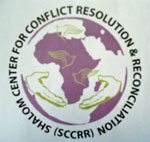Shalom Centre for Conflict Resolution & Reconciliation, Nairobi, Kenya
SCCRR
Fr Padraig Devine SMA founded the Shalom Centre for Conflict Resolution and Reconciliation, aiming to assist with conflict resolution and reconciliation in Kenya.
The necessity of having conflict management processes was illustrated during the 2008/2009 post-election violence in Kenya. Many regions of Kenya, for example, the Northern territory also experience periodic conflicts. The Shalom Centre for Conflict Resolution and Reconciliation will consist of Track II conflict management which is concerned with non-official or informal conflict management processes.
It will concentrate its work at the grassroots so as to be able to more effectively engage methods of conflict prevention consolidate peace and promote healing among different conflicting communities. The Centre will first proceed by carrying out in-depth research into various conflicts in Kenya. This research will aim to facilitate the processes of conflict mapping and analysis, so as to identify the root causes of conflict. Identifying root causes of conflict is seen as vital to conflict resolution.
The Centre will be guided by the philosophy that conflicts are essentially about inadequately met human needs. It will also uphold the philosophy that the end of physical violence in a conflict still needs to be followed up by processes of reconciliation among the parties so that the peace can endure. The Centre will therefore be informed by the search for positive peace.
This will involve pursuing the quest to overhaul anomalous structures including those dealing with human rights and the environment. This is guided by the belief that anomalous structures that are not addressed eventually contribute to physical violence. It will carry out peace-building at the grassroots by using techniques such as problem solving workshops where parties are encouraged to see their conflict as a problem to be jointly solved. It will encourage the parties in conflict to talk to each other and will aim at changing conflict-generating perceptions and thus impact on relevant cultural beliefs and patterns of behavior which undermine peace.
Changing perceptions is viewed as critical to conflict resolution. Case studies and experiences in conflict resolution and reconciliation from various parts of the world will be utilized to provide insights into Kenyan conflicts. The centre will also regularly organize training workshops for peace-building professionals in Kenya so that they can improve their peace-building techniques especially at the grassroots level.
Moreover, peace education will be conducted in schools and also with groups of opinion shapers in the conflict environment. Peace education will aim to delegitimize the use of force in solving problems. It is mainly a preventive measure aimed at fostering a culture of peace.
The centre will utilize an inter-religious approach in its conflict management so to promote a better understanding among different religious perspectives. Traditional conflict management approaches among different communities will also be respected and upheld.
The Shalom Centre for Conflict Resolution and Reconciliation (SCCRR) will implement projects and workshops to:
- Cultivate Conflict Resolution and Reconciliation between ethnic groups and nations in Africa.
- Provide conflicting parties with safe and Professionally Administered Forums for dialogue to ascertain their commitment to Conflict Resolution and Reconciliation.
- Carry out in-depth Empirical Based Research of the root causes of interstate and intrastate conflict in the conflict environment and make findings available to relevant governments, ethnic representatives and United Nation Organizations.
- Engage the conflicting parties in Problem Solving Workshops oriented to permanent peace and mutually reinforced harmony.
- Train Peace Building Professionals with the requisite skills and techniques for long term conflict prevention and management.
- Conduct Peace Education in primary and secondary schools and with groups of influential opinion shapers in conflict environments aimed at delegitimizing the use of force in solving conflicts, and thus fostering a culture of peace.

